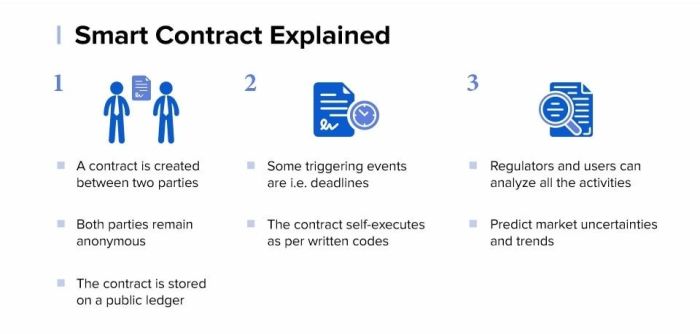Understanding the concept of smart contracts and their applications. Imagine a world where contracts execute themselves automatically, securely, and transparently. That’s the promise of smart contracts, self-executing agreements with the terms of the agreement directly written into lines of code. This revolutionary technology, built on blockchain, is transforming industries from finance to healthcare, streamlining processes and increasing trust.
Let’s dive in and explore how these digital agreements work and their potential to reshape our future.
We’ll explore the core technology behind smart contracts, including the programming languages used to create them and the crucial security considerations involved. We’ll also examine their practical applications across various sectors, highlighting both the benefits and the potential challenges. Finally, we’ll discuss the legal implications and future trends of this exciting field.
Defining Smart Contracts

Smart contracts represent a revolutionary approach to agreements, leveraging the power of blockchain technology to automate and secure contractual obligations. They’re essentially self-executing contracts with the terms of the agreement directly written into lines of code. This eliminates the need for intermediaries and ensures transparency and trust among parties involved.Smart contracts are computer programs stored on a blockchain that automatically execute when predetermined conditions are met.
This automation ensures that agreements are fulfilled without the need for human intervention, reducing delays and disputes. A key characteristic is their immutability – once a smart contract is deployed on the blockchain, its code cannot be altered, guaranteeing the integrity of the agreement.
In this topic, you find that A comparison of the energy consumption of different blockchain networks. is very useful.
Real-World Applications of Smart Contracts
Smart contracts find applications across various sectors. For example, in supply chain management, they can track goods from origin to consumer, verifying authenticity and provenance at each stage. In the finance industry, they facilitate automated payments and escrow services, reducing risks and increasing efficiency. Decentralized finance (DeFi) heavily relies on smart contracts for lending, borrowing, and trading cryptocurrencies.
The insurance industry utilizes them for automated claims processing, and the real estate sector uses them to streamline property transactions.
Traditional Contracts vs. Smart Contracts
Traditional contracts and smart contracts differ significantly in their execution and enforcement mechanisms. Traditional contracts rely on intermediaries like lawyers and notaries, often leading to delays and disputes. Smart contracts, however, are self-executing and transparent, removing the need for intermediaries and streamlining the process.
| Feature | Traditional Contract | Smart Contract | Key Differences |
|---|---|---|---|
| Enforcement | Relies on legal systems and intermediaries | Automated execution based on pre-defined conditions | Automated vs. Manual enforcement |
| Transparency | Can be opaque, accessible only to parties involved | Transparent and auditable on the blockchain | Public vs. Private access to contract terms |
| Speed | Can be slow due to legal processes and intermediaries | Fast and efficient due to automation | Instantaneous vs. Delayed execution |
| Cost | Can be expensive due to legal fees and intermediaries | Potentially lower costs due to automation and reduced intermediaries | Reduced operational costs through automation |
Technology Behind Smart Contracts

Smart contracts aren’t magic; they rely on a powerful combination of technologies, primarily blockchain, to function securely and transparently. Understanding this underlying technology is crucial to grasping their potential and limitations. This section will delve into the technical aspects, exploring the languages used, security considerations, and the lifecycle of a smart contract.
Blockchain technology forms the bedrock of smart contracts. Its decentralized, immutable ledger ensures that the contract’s terms are enforced consistently and transparently across a network of computers. Each transaction involving the smart contract is recorded on the blockchain, creating a permanent and verifiable audit trail. This eliminates the need for intermediaries and reduces the risk of fraud or manipulation.
The self-executing nature of smart contracts is directly enabled by the blockchain’s ability to automatically trigger actions based on predefined conditions.
Programming Languages for Smart Contracts
Several programming languages are specifically designed or adapted for developing smart contracts. Solidity, a high-level language specifically created for Ethereum, is the most widely used. Its syntax is similar to JavaScript, making it relatively accessible to developers with existing programming experience. Rust, a systems programming language known for its memory safety and performance, is gaining traction for its ability to create more secure and efficient smart contracts, especially for use cases requiring high performance and complex logic.
Other languages, such as Vyper (another Ethereum-focused language emphasizing simplicity and security), also play a role in the smart contract ecosystem. The choice of language often depends on the specific blockchain platform and the complexity of the contract.
Security Considerations in Smart Contract Development
Security is paramount in smart contract development. A single vulnerability can lead to significant financial losses or other severe consequences. Careful planning, rigorous testing, and adherence to best practices are essential. Formal verification methods, which mathematically prove the correctness of the code, are increasingly used to enhance security. Regular security audits by independent experts are also crucial for identifying and mitigating potential vulnerabilities before deployment.
The immutable nature of blockchain means that fixing bugs after deployment is often extremely difficult or impossible, highlighting the importance of thorough testing and review prior to deployment.
Smart Contract Lifecycle
The following flowchart illustrates the typical lifecycle of a smart contract:[Imagine a flowchart here. The flowchart would start with “Contract Design,” followed by “Coding,” then “Testing,” “Deployment,” “Execution,” and finally “Termination/Upgrade.” Arrows would connect these stages, indicating the flow. Each stage could have brief descriptions. For example, “Testing” might include unit tests, integration tests, and security audits.]
Find out further about the benefits of The potential use of blockchain technology in identity management. that can provide significant benefits.
Common Smart Contract Vulnerabilities and Mitigation Strategies
Smart contracts, despite their security features, are susceptible to various vulnerabilities. Understanding these vulnerabilities and implementing appropriate mitigation strategies is vital for building robust and secure smart contracts.
- Reentrancy: A malicious contract can recursively call the function it’s interacting with, potentially draining funds or causing unexpected behavior. Mitigation: Implement checks-effects-interactions pattern, using a mutex lock, or employing a reentrancy guard.
- Arithmetic Overflow/Underflow: Incorrect handling of large numbers can lead to unexpected results. Mitigation: Use SafeMath libraries that handle overflow/underflow exceptions or use languages that inherently prevent these issues.
- Denial of Service (DoS): Malicious actors can make the contract unusable by overwhelming it with requests. Mitigation: Implement rate limiting, input validation, and circuit breakers.
- Logic Errors: Flaws in the contract’s logic can lead to unintended consequences. Mitigation: Thorough code reviews, formal verification, and extensive testing are crucial.
- Gas Limit Issues: Insufficient gas allocation can prevent a transaction from completing, leaving the contract in an inconsistent state. Mitigation: Accurate gas estimation and appropriate gas limit setting are vital.
Applications of Smart Contracts: Understanding The Concept Of Smart Contracts And Their Applications.

Smart contracts, once a futuristic concept, are rapidly becoming integral to various industries. Their ability to automate agreements and enforce terms automatically is revolutionizing how we conduct business and interact with technology. This section explores some key applications across different sectors.
Smart Contracts in Finance
The finance industry is experiencing a significant transformation thanks to smart contracts. Decentralized finance (DeFi) platforms leverage smart contracts to facilitate peer-to-peer lending, borrowing, and trading without intermediaries. This eliminates traditional financial gatekeepers and reduces transaction costs. Escrow services, traditionally handled by third parties, can be automated using smart contracts, ensuring secure and transparent transfer of funds upon fulfillment of predetermined conditions.
For example, a smart contract could hold funds for a real estate transaction, releasing them to the seller only after the buyer confirms receipt of the property. This minimizes the risk of fraud and disputes.
Smart Contracts in Supply Chain Management
Supply chains often involve multiple parties, leading to complexities in tracking goods and verifying authenticity. Smart contracts can enhance transparency and traceability by recording each stage of the supply chain on a blockchain. This creates an immutable record, making it easier to track products, identify counterfeits, and improve efficiency. Imagine a smart contract managing the shipment of pharmaceuticals, automatically triggering alerts if the temperature deviates from optimal levels or if a product is delayed.
This ensures product quality and enhances consumer trust.
Smart Contracts in Healthcare
The healthcare sector faces challenges in managing sensitive patient data securely and efficiently. Smart contracts offer a potential solution by enabling secure access control to medical records. A patient could grant specific healthcare providers access to their data through a smart contract, while maintaining control over who sees what information. This improves data privacy and streamlines the sharing of medical information between doctors and hospitals.
Smart contracts could also be used to manage insurance claims, automatically processing payments upon verification of treatment.
Smart Contracts in Voting
The voting process, often susceptible to fraud and manipulation, can benefit from the security and transparency offered by smart contracts. A secure, blockchain-based voting system could record votes immutably, making it nearly impossible to alter results. This could enhance trust in the electoral process and improve participation. While challenges remain in implementing such a system on a large scale, the potential for a more secure and transparent voting system is significant.
However, considerations for voter anonymity and system accessibility are crucial for widespread adoption.
Categorization of Smart Contract Applications
| Industry | Application | Benefits |
|---|---|---|
| Finance | Decentralized finance (DeFi), escrow services, payments | Reduced costs, increased transparency, faster transactions |
| Supply Chain Management | Tracking goods, verifying authenticity, managing logistics | Improved traceability, enhanced transparency, reduced fraud |
| Healthcare | Secure data access, insurance claims processing, managing medical records | Improved data privacy, streamlined processes, efficient claims handling |
| Voting | Secure and transparent voting system | Increased trust, reduced fraud, improved participation |
| Real Estate | Property registration, escrow services, lease agreements | Faster transactions, reduced paperwork, increased security |
Legal and Regulatory Aspects

The legal landscape surrounding smart contracts is complex and rapidly evolving. Their decentralized nature and reliance on code present unique challenges for traditional legal frameworks designed for human-to-human agreements. Understanding the legal enforceability, potential pitfalls, and the role of audits is crucial for anyone considering deploying smart contracts.The legal enforceability of smart contracts varies significantly across jurisdictions. Some countries are actively developing specific legal frameworks for smart contracts, while others are adapting existing contract law to address the unique characteristics of this technology.
This lack of global uniformity creates complexities for businesses operating internationally.
Legal Enforceability of Smart Contracts
The enforceability of a smart contract hinges on several factors, including the jurisdiction where the contract is executed, the nature of the underlying agreement, and whether the code functions as intended. Many legal systems treat smart contracts as a type of computer code that governs the terms of a contract, similar to how an algorithm might be used in a traditional contract.
However, the automated and immutable nature of smart contracts raises novel questions regarding issues such as breach of contract, dispute resolution, and liability for code errors. Some legal systems might view the smart contract as an enforceable agreement, while others may focus on the underlying agreement or consider the smart contract merely as evidence of the agreement.
Potential Legal Challenges
Several legal challenges are associated with the use of smart contracts. These include issues surrounding: data privacy and security breaches, intellectual property rights, jurisdictional ambiguity, and the potential for unforeseen code vulnerabilities leading to contract breaches. For example, a smart contract might inadvertently transfer funds to the wrong address due to a coding error, leading to disputes and potential legal action.
Similarly, a smart contract might fail to account for certain events or circumstances, resulting in an unexpected outcome and a breach of the underlying agreement.
The Role of Smart Contract Audits, Understanding the concept of smart contracts and their applications.
Smart contract audits are crucial for ensuring both security and compliance. Independent audits by qualified professionals can identify potential vulnerabilities in the code that could lead to legal problems or financial losses. A thorough audit should examine the code for bugs, security flaws, and compliance with relevant regulations. The audit report serves as evidence of due diligence, mitigating legal risk for businesses.
Consider the case of The DAO hack in 2016, where a vulnerability in the smart contract led to the loss of millions of dollars. A comprehensive audit might have prevented this catastrophic event.
Comparison of Legal Frameworks
Traditional contract law emphasizes the intent and agreement between parties, often relying on interpretation and negotiation to resolve disputes. Smart contracts, on the other hand, are governed by the code itself. This presents a fundamental difference: traditional contracts rely on human interpretation, while smart contracts rely on the execution of code. This shift necessitates a careful consideration of how traditional legal principles apply to this new technological context.
Legal frameworks for smart contracts need to adapt to address the inherent limitations and potential failures of code.
Key Legal Considerations for Businesses Deploying Smart Contracts
Before deploying smart contracts, businesses should carefully consider the following:
- Jurisdictional issues: Determine which jurisdiction’s laws govern the contract and ensure compliance.
- Contractual clarity: Ensure the smart contract’s code accurately reflects the intended agreement, avoiding ambiguity.
- Security audits: Conduct thorough security audits to identify and mitigate potential vulnerabilities.
- Dispute resolution mechanisms: Establish clear mechanisms for resolving disputes arising from the smart contract.
- Data privacy and security: Implement measures to protect sensitive data used within the smart contract.
- Intellectual property rights: Protect any intellectual property embedded within the smart contract.
- Compliance with applicable regulations: Ensure compliance with all relevant laws and regulations, including those related to financial transactions, data protection, and consumer protection.
Smart contracts represent a significant leap forward in how we create and enforce agreements. By automating trust and eliminating intermediaries, they promise greater efficiency, transparency, and security across a wide range of applications. While challenges remain, particularly in legal frameworks and scalability, the potential benefits are immense. As blockchain technology continues to evolve, smart contracts are poised to become an integral part of our digital future, fundamentally changing how we interact and transact.